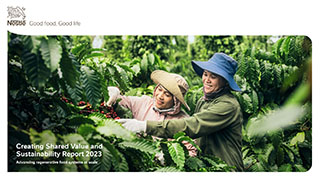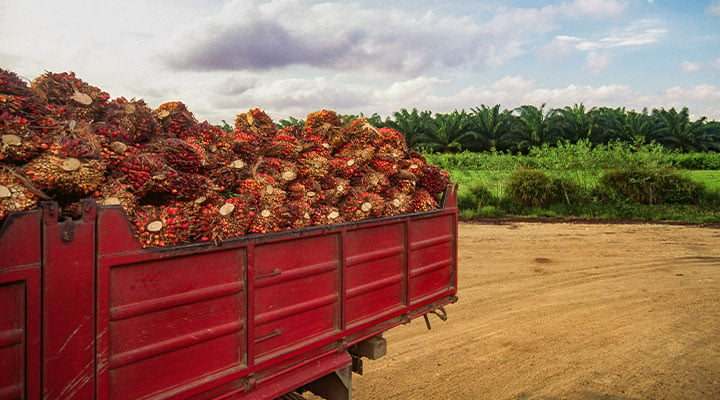Forced labor and responsible recruitment

More than 27 million people are thought to be subject to forced labor around the world, mostly in unregulated industries dependent on large numbers of manual laborers, such as agriculture.
Forced labor is any work or service that is exacted from any person under threat of any penalty and for which that person has not offered themself voluntarily. Nestlé can play an important role in helping address this issue – for example, by using our influence to promote and ensure fair and equitable recruitment practices.
Our action plan on forced labor and responsible recruitment, one of our 10 salient human rights issues, will help us address the risks associated with forced labor.
Addressing workers' rights
We are addressing the risk of forced labor in various agricultural supply chains by developing programs targeting forced labor indicators, like unethical recruitment practices. For example, we have supported the development of a human rights-based due diligence tool for ethical recruitment in palm oil supply chains that can be used by suppliers looking to responsibly recruit workers.
Our key actions on forced labor
- Strengthen Nestlé’s commitments on forced labor and responsible recruitment in line with existing and emerging best practice
- Train relevant employees and staff on forced labor risks
- Strengthen direct suppliers’ capacity to uphold Nestlé’s requirements on forced labor and responsible recruitment as part of our Supplier Human Rights and Environmental Due Diligence (HREDD) Assurance Framework
- Engage and support prioritized direct suppliers in taking actions to address forced labor risks and impacts in their own operations and supply chain
- Identify and prioritize specific interventions addressing forced labor risks at national and subnational levels
- Engage in collaborative approaches to develop community-based or government-based grievance mechanisms
Advocating for workers in the palm oil industry
Nestlé sources palm oil from over 80 suppliers in over 20 countries. Its production is labor-intensive, conducted over vast swathes of land, often in remote locations. Workers are vulnerable to long hours, low wages and restricted movement, often unable to collectively advocate for better conditions. The industry attracts migrant workers, who may have been unethically recruited or forced to pay excessive fees to get a job.
For more than 10 years we have been working to advance labor rights in palm oil, collaborating with suppliers, governments and nongovernmental organizations. In 2020, we piloted a new framework for labor rights in palm oil, developed with our partner Verité, before rolling it out across our entire palm oil supply chain. It is part of our Palm Oil Labor Rights Action Plan (pdf 381Kb) that runs through to 2025.
We use an approach developed by the Earthworm Foundation to assess risks of forced labor, slavery and human trafficking. This digital tool involves detailed reviews of each stage of a company’s recruitment process so we can evaluate the recruitment experiences of foreign workers. The tool helps check that suppliers are compliant with the law. We have begun deploying this with suppliers in Malaysia.

Protecting migrant workers from exploitation in Türkiye
Nestlé has been a project partner on the Fair Labor Association's Harvesting the Future project since 2019. The project seeks to help producers improve working conditions for seasonal workers who migrate across different food industries in Türkiye and surrounding countries on a six- to eight-month cycle.
The project’s efforts include eliminating hazardous work for workers under 18, strengthening responsible recruitment, improving access to grievance mechanisms, adherence to living wages and addressing child labor. Central to the project is training staff within our supplier organizations and guiding them in improving recruitment and employment practices among seasonal migrant agriculture workers in Türkiye.
Giving seafood workers a voice
In Thailand, where a portion of Nestlé’s seafood is sourced, we work with the Issara Institute to analyze recruitment practices within the fishing industry and to root out unfair and unethical arrangements. Issara works with recruitment agencies, grassroots organizations and the government, to empower seafood workers by ensuring they can safely voice grievances and access remediation services. Through our relationship with Issara and other partners, our seafood suppliers in Thailand have all improved responsible recruitment practices since 2018.
Tackling human trafficking
Modern slavery is unacceptable and heartbreaking – tens of millions of people globally are thought to be subject to coercive working arrangements. Our UK and Australian market teams have collaborated to create a joint response to legislation in both their countries around modern slavery and human trafficking. Their Modern Slavery Statement (pdf, 39.3Mb) outlines a shared approach to the issues and demonstrates how we can use our influence to help ensure consistency across borders.


















